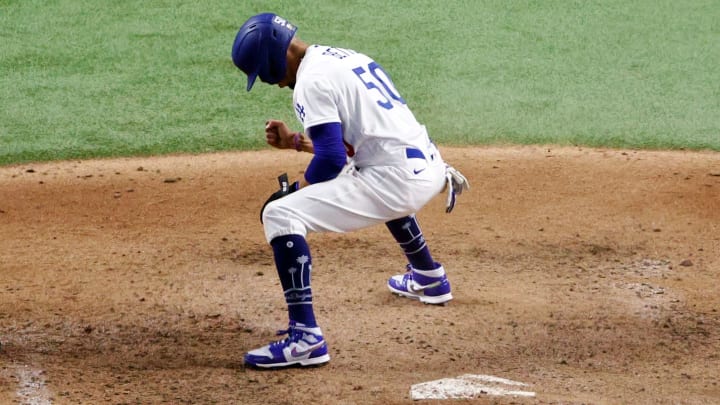Mookie Betts is a Player for All Times and Tenses
By Kyle Koster

In one of his two Magellan-like trips around the bases last night, Mookie Betts dove headfirst into three consecutive bags, easily beating throws and tags and forces fighting against complimentary tacos. It was a spellbinding display of grace, speed, and guile as he turned a walk into a pivotal run by virtue of two stolen bases and a brilliantly fearless scamper home on an infield grounder.
This euphoric stretch was baseball at its finest, the perfect blend of world-class athleticism and intelligence working together in concert to make powerful music, a movement given a loud coda with a tack-on homer from Betts later. The performance was plainly historic as the do-everything outfielder became the first player in Major League history since Babe Ruth with two steals, two runs, and a dinger in the same contest.
It's only Game 1 of the World Series and we're running out of ways to describe Betts. And perhaps that's instructive. Because no matter how old the fan delighting in his every move is, they are transported to the past. To a time they only know through history books. To watch such a unicorn is to understand for the first time what people felt when they watched a young Willie Mays or Mickey Mantle.
Betts captures the wonder of graceful creatures completely comfortable in every setting. In the limitless expanse of the outfield. In the pressure-packed batter's box. Carrying a pivotal run on their backs while navigating the basepaths. He has approached the platonic ideal of a ballplayer who can do it all, a Swiss Army knife with dozens of interchangeable tools.
When Mays was patrolling center and blasting deep drives it became necessary to distill his greatness by explaining the only person capable of defending his power was himself. That the only man who could catch it, hit it. Mantle was described as a celebrity in his own clubhouse, an infectious and larger-than-life figure in a sea of big egos and paychecks.
These are both true of Betts. The only man who can stop him is himself. His smile explodes like any number of War Memorial lightbulbs vanquished by a Roy Hobbs' homer. He is the megawatt star, the transcendent player ripped from a Hollywood script ready and willing to inherit and discharge the duties of the nebulous Face of Baseball role now and for years to come. There's a beautiful connective tissue at work bringing both the present and past and future alive. A subtle Inception at work, though we're no longer waiting for the train because it's long ago pulled into the station with engines blaring.
The objective backs up the subjective. The data matches the eye test. Betts marries the two camps together in bliss. Everyone can agree that this guy, well, he's damn good. Numbers match the unmistakable narrative.
And there's something about him that feels rare. Watching him play and dominate conjures up the timeless experience of attending a game at any level and slowly realizing that the second baseman or catcher or starting pitcher is special. That he can do it all. That scouts are about to discover this and come in droves to put 70s or 80s in their notebooks and share knowing glances that they are looking at the next big thing.
Replicating this at the highest level is the mark of a true great. Casual viewers are learning that there's nothing Betts can't do and do spectacularly. Better yet, he makes it look so smooth. He is Will Hunting asking the world if they know how easy this all is for him in the most genial way possible. Baseball lifers are trying to run his equations and coming up far short of Fields Medal-level understanding because they are so new and understanding.
Betts is a player for all times. An all-timer offering a glimpse back and forward while blinding now. Yet no one can look away.